Six prisoners executed at Iran's Ghezel Hesar Prison in one day, rights groups say
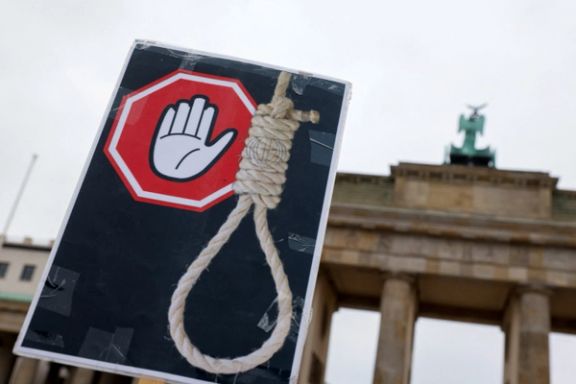
At least six prisoners were executed at Ghezel Hesar Prison in Karaj on Wednesday, according to the US-based Human Rights Activists News Agency (HRANA).

At least six prisoners were executed at Ghezel Hesar Prison in Karaj on Wednesday, according to the US-based Human Rights Activists News Agency (HRANA).
One prisoner was convicted of murder, four were sentenced to death for drug-related charges, and one was executed on charges of "spreading corruption on earth" by instilling fear in women and causing them harm.
This comes as the Iran Human Rights Organization reports a sharp rise in executions across the country, with at least 166 people hanged in October alone—the highest monthly total in over 20 years.
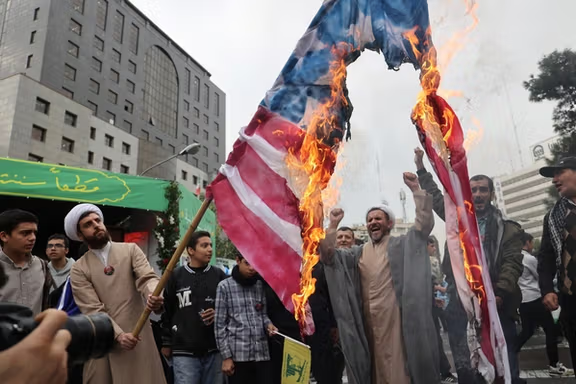
Iranian MP Mojtaba Rahmandoust warned Tuesday that if American flags on youth clothing are not stopped, young people will soon start tattooing the Israeli flag.
The MP expressed concern that Iran’s regional allies might view such behavior among the youth unfavorably, interpreting it as a reflection of poor judgment rather than an affinity for these nations.
“Should foreign photographers or international media outlets circulate images of our people wearing garments adorned with the American or Israeli flag, our standing in the Islamic world and among the members of the Axis of Resistance [Tehran-backed armed groups] would be severely compromised," he added. "It must be emphasized that many of the young individuals who bear tattoos of the American flag or don attire featuring it do so out of ignorance, and not from any heartfelt belief in the United States or Israel."
This sentiment comes as Tehran hardliners regularly burn Israeli and US flags during rallies, chanting "Death to Israel" and "Death to the US" They also paint these flags on pavements to encourage people to trample them. However, for years, many Iranians—particularly students at universities—have actively avoided stepping on the American and Israeli flags painted by agents of the Islamic Republic.
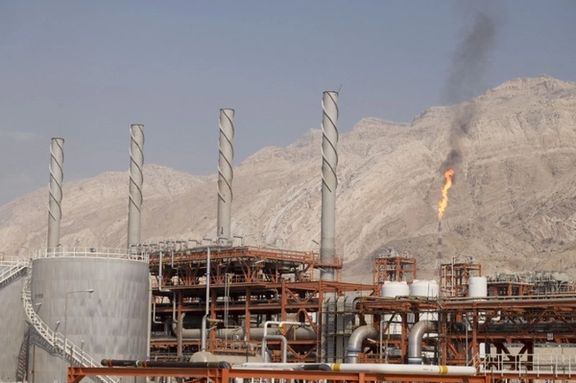
Iran’s Oil Minister Mohsen Paknejad on Wednesday denied reports that Iran’s oil exports have declined.
"This is part of the enemies' psychological warfare. We have no problems with selling oil." Iran International reported earlier this month that China has drastically reduced secret oil imports from Iran.
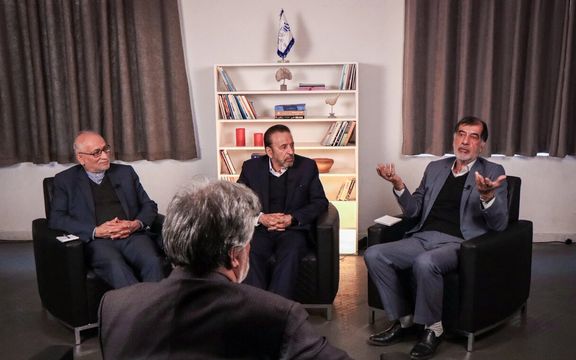
Three prominent centrist and conservative figures in Iran have suggested that the country’s political doctrine must change to address its ongoing problems, especially the economic impasse.
During a roundtable discussion hosted by Sazandegi newspaper, conservative politician and Expediency Council member Mohammad Reza Bahonar, former senior lawmaker and centrist politician Hossein Marashi, and Mahmoud Vaezi, a senior aide to former president Hassan Rouhani, carefully avoided directly naming Supreme Leader Ali Khamenei as the ultimate authority responsible for the country’s major shortcomings.
They spoke cautiously, as some of their critical remarks touched on highly sensitive topics, including constitutional changes and political reforms. The veteran political insiders would not have voiced such criticisms publicly two or three years ago, before Iran's regional influence began to wane and its economic situation reached a critical stage.
They highlighted issues including the government's lack of resources, largely due to massive expenditures in the Middle East aimed at undermining Israel—spending that was undertaken without the consent of the Iranian people or parliament (Majles), as they noted.
Marashi said, "Iran's priority should be addressing its economic crisis," and "politics in Iran should not be left to military organizations," likely referring to the central role the Revolutionary Guards play both in political and economic spheres.
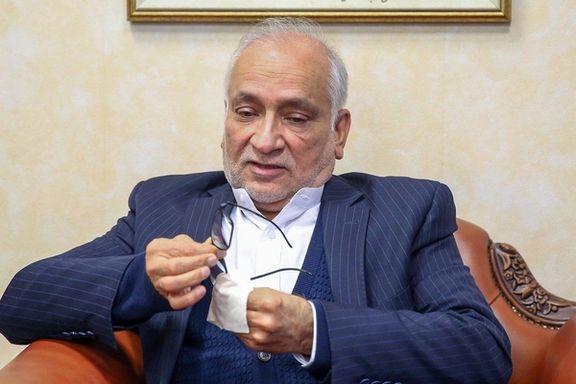
He added: “The government’s priorities remain focused on outdated ideological issues, such as enforcing the hijab on women and restricting access to information on the Internet, rather than tackling the country’s pressing economic crises.”
These failures have left the nation struggling in darkness and cold since November, as the oil-rich country continues to fall short in producing sufficient natural gas and electricity in generating sufficient oil export revenues.
A huge part of the country's income from oil is kept outside the government's treasury and under direct supervision of the Supreme Leader and the Revolutionary Guard.
On December 16 all government offices and schools in 26 of the 31 Iranian provinces were shut down due to blackouts, power shortages and consumption of pollutant fuels in many power plants.
Without elaborating on what was wrong with the Iranian Constitutional Law, Bahonar said that “all the articles of the constitution can be revised except a few that are about the essence of Islam and the nature of the political system as a republic.”
His remarks likely implied that institutions such as the Guardian Council, which hinder free and fair elections, could be dismantled, and that articles granting extraordinary powers to the Supreme Leader could be revised. This would help curb unnecessary spending on religious institutions and costly military ventures abroad.
Elsewhere in their debate, the three politicians said that many of Iran's problems are caused by flaws in the structure of its political system. Without saying how the current system has led to a dictatorship under the Supreme Leader, they called for a democratic political system like those in Japan, Pakistan, Germany, France and the United States.
Marashi criticized Pezeshkian for taking pride in lacking a clear plan for his government or a political party to advance his ideas. He also pointed to the Islamic Republic’s core doctrine, which centers on its ongoing struggle against what it calls “arrogant powers”—a concept now largely synonymous with anti-Americanism.
He argued that “this doctrine cannot drive meaningful progress and must be reformed, much like how China abandoned its rigid ideological approach to achieve development.”
Marashi went on to question the extensive powers of Iran's Judiciary and the absence of judicial independence. He also criticized the current Majles for consistently obstructing the government’s ability to fulfill its responsibilities.
Additionally, he emphasized that Iran’s economy has been held hostage by its nuclear program for the past 19 years. Highlighting the fall of Bashar al-Assad in Syria, he said: “Even maintaining our allies in power depends on prioritizing the economy.”
At the same time, perhaps in an effort to absolve President Masoud Pezeshkian of responsibility for the current crises, three other conservative figures, in reports published by Nameh News website, emphasized that "the Pezeshkian administration has inherited the current economic and political problems from previous governments."

Two Romanian men arrested in Romania over the stabbing of Iran International presenter Pouria Zeraati have been extradited to Britain, where the attack took place in March 2024.
British police confirmed on Tuesday that the men, Nandito Badea, 19, and George Stana, 23, were taken into custody at Heathrow Airport after being detained by authorities in Romania earlier this month.
The pair face charges of wounding with intent to cause grievous bodily harm. They are set to appear in Westminster Magistrates’ Court on Dec. 18.
Zeraati, a British-Iranian, sustained leg injuries in the attack near his home in Wimbledon, southwest London. His case raised concerns over threats to critics of Iran's government, with British officials investigating whether Zeraati was targeted for his work.
Iran has denied any involvement in the case or attempts to target Iranian dissidents abroad.
Officials in Britain and the United States say Tehran recruits criminals to intimidate and attack dissidents.
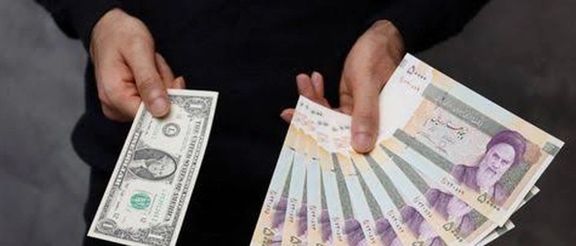
Iran's Central Bank chief Mohammadreza Farzin blames 'psychological operations' abroad for the sharp decline of the country's currency.
"They published a negative story every few hours," Farzin asserted, referring to US outlets that he said systematically derail his measures.
The Iranian rial plunged to a historic low against the US dollar on Wednesday, exceeding 780,000 rials per dollar. This marks a nearly 50% decline in the currency's value over the past year.